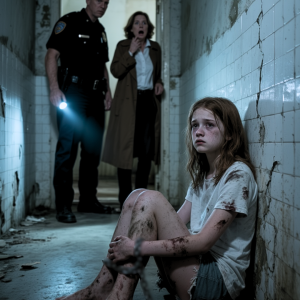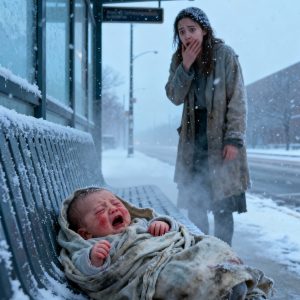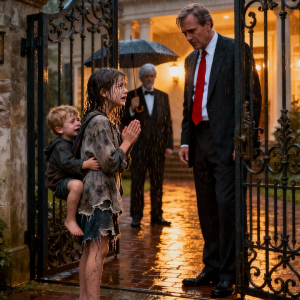
When we pulled into our driveway that chilly Sunday evening, our front yard looked like it had survived a storm. Broken lights, scattered decorations, and torn cobwebs covered the lawn that had once glowed with cheerful Halloween spirit. I did not understand how something that had brought us so much joy could turn into such a heartbreaking sight. What we discovered later on the neighbor’s security footage would change our family forever.
Our home sits in a peaceful neighborhood just outside Portland, the kind of place where children ride their bikes until dusk and neighbors chat over fences. My husband Elliot and I had moved here five years ago, hoping to build a quiet life for our two children, Clara and Henry, who were eight and six. They adored every holiday, but Halloween was their favorite.
For weeks, they planned their costumes and drew pictures of ghosts and pumpkins to tape to the windows. Elliot and I turned our front yard into a playful haunted garden, complete with glowing pumpkins, a talking witch, and a line of flickering candles along the walkway. It had become our family’s proud little tradition, one that made our children squeal with delight.
Before the holiday weekend, we drove upstate to visit my father. He had been ill, and we promised to spend a few days helping him around the house. When we left, the decorations were shining proudly under the porch light. It felt good knowing we were bringing a bit of Halloween magic to our street.
When we returned that Sunday, the magic was gone.
Every pumpkin was smashed. The string lights were ripped down and tossed into the bushes. The plastic ghosts lay in the mud, and the witch that had made Henry laugh so much was nothing but shattered pieces. The sight stunned us all. Clara’s small voice trembled as she asked, “Why would someone do this?” Henry’s eyes filled with tears, and I pulled both of them close, unsure what to say.
Elliot’s face darkened with quiet anger. He went inside, unlocked his phone, and opened the security camera app that watched over the yard. I followed with the children still clinging to my coat. After a moment, he looked up with a grim expression. “The camera was turned off,” he said. “Someone did this on purpose.”
The thought sent a chill through me that had nothing to do with the cold night air.
We decided to talk to our neighbors. Most had been away for the weekend and had not seen anything strange. Finally, we knocked on the door of Mr. Dalton, who lived across the street. He was a kind man who kept his porch lights on for trick-or-treaters every year. When he heard what happened, his face turned serious. “I didn’t see it, but my camera might have caught something,” he said, motioning us inside.
He opened his laptop and scrolled through the footage. Then he stopped. “There,” he whispered.
Elliot leaned closer, and I did too. The figure on the screen was unmistakable. It was his mother, Patricia.

For a moment, the room went silent. Elliot’s hand froze on the desk, and his mouth opened slightly as if words might come, but none did. I felt my stomach twist with disbelief.
Patricia had never liked me. From the day I met her, she made sure I knew I would never be good enough for her son. Every visit ended with a snide remark about our parenting or our home. Still, she adored the children, or so I had thought. To see her ripping down their decorations, tearing apart something that brought them so much happiness, broke something inside me.
Elliot thanked Mr. Dalton and walked out without a word. I followed him home in silence. Once the kids were upstairs, he grabbed his keys. “I have to talk to her,” he said. His voice was calm, but his eyes looked heavy and cold.
When he returned two hours later, he sank into the chair by the window. “She admitted it,” he said quietly. “She said she was angry we went to visit your father instead of her. She felt forgotten.” He rubbed his face with both hands. “She said she just wanted to get our attention.”
The sadness in his voice was deeper than his anger.
That night, we called the police. We told them we were not seeking punishment, only accountability. The officer listened, took notes, and assured us he would speak to her. Within days, word spread through the neighborhood. People offered sympathy, and some even brought over decorations for the children to replace what had been lost.
Patricia eventually had to pay for the damages. Then, one afternoon, there was a soft knock at the door. When I opened it, she stood there holding a pie and looking far older than she had before. Her eyes were red, her voice barely above a whisper. “May I come in?” she asked.
Elliot joined me at the door. She apologized, not with excuses, but with tears. When she asked to see the children, I hesitated, but he nodded. Clara and Henry came downstairs, unsure what was happening. Patricia knelt on the floor and looked at them both.
“I broke something that mattered to you,” she said. “I was lonely, and I made a terrible choice. I am so sorry.”
Clara crossed her arms, but Henry stepped forward and hugged her. “It’s okay, Grandma,” he said softly. “We can make new ones.” Clara joined him a moment later, and Patricia began to cry harder than before.
Over the next week, she helped them rebuild everything. The laughter returned to the yard. By Thanksgiving, she had begun to earn back a place at the table.
That evening, as we sat surrounded by family, I realized something important. Sometimes the people who hurt us are not villains, only broken hearts reaching out in the wrong way. And sometimes forgiveness, even when it feels impossible, is the only thing that can heal what anger destroys.




